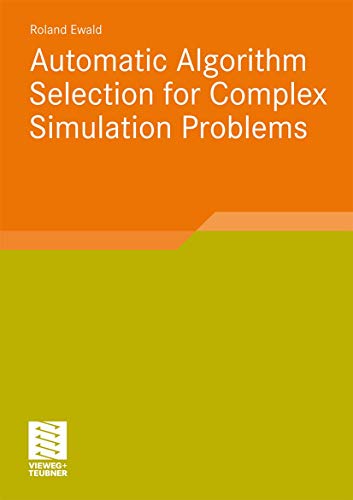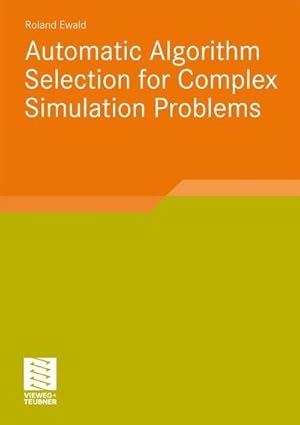Automatic Algorithm Selection Complex by Ewald Roland (11 results)
Search filters
Product Type
- All Product Types
- Books (11)
- Magazines & Periodicals (No further results match this refinement)
- Comics (No further results match this refinement)
- Sheet Music (No further results match this refinement)
- Art, Prints & Posters (No further results match this refinement)
- Photographs (No further results match this refinement)
- Maps (No further results match this refinement)
- Manuscripts & Paper Collectibles (No further results match this refinement)
Condition Learn more
- New (9)
- As New, Fine or Near Fine (1)
- Very Good or Good (1)
- Fair or Poor (No further results match this refinement)
- As Described (No further results match this refinement)
Binding
- All Bindings
- Hardcover (No further results match this refinement)
- Softcover (11)
Collectible Attributes
- First Edition (No further results match this refinement)
- Signed (No further results match this refinement)
- Dust Jacket (No further results match this refinement)
- Seller-Supplied Images (5)
- Not Print on Demand (8)
Language (1)
Price
- Any Price
- Under US$ 25 (No further results match this refinement)
- US$ 25 to US$ 50 (No further results match this refinement)
- Over US$ 50
Free Shipping
- Free Shipping to U.S.A. (No further results match this refinement)
Seller Location
Seller Rating
-
Automatic Algorithm Selection for Complex Simulation Problems
Language: English
Published by Vieweg+Teubner Verlag, 2011
ISBN 10: 383481542X ISBN 13: 9783834815422
Seller: Ria Christie Collections, Uxbridge, United Kingdom
US$ 122.39
US$ 16.06 shipping
Ships from United Kingdom to U.S.A.Quantity: Over 20 available
Add to basketCondition: New. In.
-
Automatic Algorithm Selection for Complex Simulation Problems
Language: English
Published by Vieweg+Teubner Verlag 2011-11-14, 2011
ISBN 10: 383481542X ISBN 13: 9783834815422
Seller: Chiron Media, Wallingford, United Kingdom
US$ 122.39
US$ 20.77 shipping
Ships from United Kingdom to U.S.A.Quantity: 10 available
Add to basketPaperback. Condition: New.
-
Automatic Algorithm Selection for Complex Simulation Problems
Language: English
Published by Vieweg + Teubner Verlag, 2011
ISBN 10: 383481542X ISBN 13: 9783834815422
Seller: Revaluation Books, Exeter, United Kingdom
US$ 177.58
US$ 16.76 shipping
Ships from United Kingdom to U.S.A.Quantity: 2 available
Add to basketPaperback. Condition: Brand New. 2012 edition. 420 pages. 8.27x5.91x0.87 inches. In Stock.
-
Taschenbuch. Condition: Neu. Automatic Algorithm Selection for Complex Simulation Problems | Roland Ewald | Taschenbuch | xxi | Englisch | 2011 | Vieweg & Teubner | EAN 9783834815422 | Verantwortliche Person für die EU: Springer Vieweg in Springer Science + Business Media, Abraham-Lincoln-Str. 46, 65189 Wiesbaden, juergen[dot]hartmann[at]springer[dot]com | Anbieter: preigu.
-
Automatic Algorithm Selection for Complex Simulation Problems
Language: English
Published by Vieweg+Teubner Verlag, 2011
ISBN 10: 383481542X ISBN 13: 9783834815422
Seller: AHA-BUCH GmbH, Einbeck, Germany
Taschenbuch. Condition: Neu. Druck auf Anfrage Neuware - Printed after ordering - To select the most suitable simulation algorithm for a given task is often difficult. This is due to intricate interactions between model features, implementation details, and runtime environment, which may strongly affect the overall performance. An automated selection of simulation algorithms supports users in setting up simulation experiments without demanding expert knowledge on simulation. Roland Ewald analyzes and discusses existing approaches to solve the algorithm selection problem in the context of simulation. He introduces a framework for automatic simulation algorithm selection and describes its integration into the open-source modelling and simulation framework James II. Its selection mechanisms are able to cope with three situations: no prior knowledge is available, the impact of problem features on simulator performance is unknown, and a relationship between problem features and algorithm performance can be established empirically. The author concludes with an experimental evaluation of the developed methods.
-
Automatic Algorithm Selection for Complex Simulation Problems
Language: English
Published by Vieweg+Teubner Verlag, Vieweg+Teubner Verlag Nov 2011, 2011
ISBN 10: 383481542X ISBN 13: 9783834815422
Seller: buchversandmimpf2000, Emtmannsberg, BAYE, Germany
Taschenbuch. Condition: Neu. Neuware -To select the most suitable simulation algorithm for a given task is often difficult. This is due to intricate interactions between model features, implementation details, and runtime environment, which may strongly affect the overall performance. An automated selection of simulation algorithms supports users in setting up simulation experiments without demanding expert knowledge on simulation.Roland Ewald analyzes and discusses existing approaches to solve the algorithm selection problem in the context of simulation. He introduces a framework for automatic simulation algorithm selection and describes its integration into the open-source modelling and simulation framework James II. Its selection mechanisms are able to cope with three situations: no prior knowledge is available, the impact of problem features on simulator performance is unknown, and a relationship between problem features and algorithm performance can be established empirically. The author concludes with an experimental evaluation of the developed methods.Springer Vieweg in Springer Science + Business Media, Abraham-Lincoln-Straße 46, 65189 Wiesbaden 404 pp. Englisch.
-
Automatic Algorithm Selection for Complex Simulation Problems
Language: English
Published by Vieweg+Teubner Verlag, 2011
ISBN 10: 383481542X ISBN 13: 9783834815422
Seller: Buchpark, Trebbin, Germany
US$ 102.35 10% offUS$ 92.12
US$ 122.81 shipping
Ships from Germany to U.S.A.Quantity: 1 available
Add to basketCondition: Gut. Zustand: Gut | Seiten: 404 | Sprache: Englisch | Produktart: Bücher | To select the most suitable simulation algorithm for a given task is often difficult. This is due to intricate interactions between model features, implementation details, and runtime environment, which may strongly affect the overall performance. An automated selection of simulation algorithms supports users in setting up simulation experiments without demanding expert knowledge on simulation. Roland Ewald analyzes and discusses existing approaches to solve the algorithm selection problem in the context of simulation. He introduces a framework for automatic simulation algorithm selection and describes its integration into the open-source modelling and simulation framework James II. Its selection mechanisms are able to cope with three situations: no prior knowledge is available, the impact of problem features on simulator performance is unknown, and a relationship between problem features and algorithm performance can be established empirically. The author concludes with an experimental evaluation of the developed methods.
-
Automatic Algorithm Selection for Complex Simulation Problems
Language: English
Published by Vieweg+Teubner Verlag, 2011
ISBN 10: 383481542X ISBN 13: 9783834815422
Seller: Mispah books, Redhill, SURRE, United Kingdom
US$ 196.13
US$ 33.52 shipping
Ships from United Kingdom to U.S.A.Quantity: 1 available
Add to basketPaperback. Condition: Like New. Like New. book.
-
Automatic Algorithm Selection for Complex Simulation Problems (eng)
Language: English
Published by Vieweg+Teubner Verlag, 2011
ISBN 10: 383481542X ISBN 13: 9783834815422
Seller: Brook Bookstore On Demand, Napoli, NA, Italy
Condition: new. Questo è un articolo print on demand.
-
Automatic Algorithm Selection for Complex Simulation Problems
Language: English
Published by Vieweg+Teubner Nov 2011, 2011
ISBN 10: 383481542X ISBN 13: 9783834815422
Seller: BuchWeltWeit Ludwig Meier e.K., Bergisch Gladbach, Germany
Taschenbuch. Condition: Neu. This item is printed on demand - it takes 3-4 days longer - Neuware -To select the most suitable simulation algorithm for a given task is often difficult. This is due to intricate interactions between model features, implementation details, and runtime environment, which may strongly affect the overall performance. An automated selection of simulation algorithms supports users in setting up simulation experiments without demanding expert knowledge on simulation. Roland Ewald analyzes and discusses existing approaches to solve the algorithm selection problem in the context of simulation. He introduces a framework for automatic simulation algorithm selection and describes its integration into the open-source modelling and simulation framework James II. Its selection mechanisms are able to cope with three situations: no prior knowledge is available, the impact of problem features on simulator performance is unknown, and a relationship between problem features and algorithm performance can be established empirically. The author concludes with an experimental evaluation of the developed methods. 382 pp. Englisch.
-
Automatic Algorithm Selection for Complex Simulation Problems
Language: English
Published by Vieweg+Teubner Verlag, 2011
ISBN 10: 383481542X ISBN 13: 9783834815422
Seller: moluna, Greven, Germany
US$ 111.16
US$ 57.30 shipping
Ships from Germany to U.S.A.Quantity: Over 20 available
Add to basketCondition: New. Dieser Artikel ist ein Print on Demand Artikel und wird nach Ihrer Bestellung fuer Sie gedruckt. To select the most suitable simulation algorithm for a given task is often difficult. This is due to intricate interactions between model features, implementation details, and runtime environment, which may strongly affect the overall performance. An aut.








